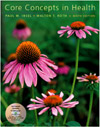 |  Core Concepts in Health, 9/e Paul M. Insel,
Stanford University School of Medicine
Walton T. Roth,
Stanford University School of Medicine
Contraception
Health Links
Alan Guttmacher Institute
(http://www.agi-usa.org)
Provides information and research on contraception and other reproductive health issues; the section on prevention and contraception includes current statistics on contraceptive use and policy analysis. Articles on a variety of issues are available online from the journals Family Planning Perspectives, International Family Planning Perspectives, and the Guttmacher Report on Public Policy. |
 |  |  | Association of Reproductive Health Professionals
(http://www.arhp.org)
Offers educational materials about family planning and other reproductive health issues; also provides an interactive questionnaire to help people choose contraceptive methods. |
 |  |  | CONRAD Contraceptive Research and Development Program
(http://www.conrad.org)
CONRAD seeks to develop new or improved contraceptive methods that are safe, effective, acceptable, and suitable for use in the United States and developing countries; the site provides detailed information about CONRAD, contraceptive research, and links to general contraceptive information. |
 |  |  | Emergency Contraception Web site
(http://ec.princeton.edu)
Provides extensive information about emergency contraception; sponsored by the Office of Population Research at Princeton University. |
 |  |  | Engender Health
(http://www.engenderhealth.org)
An advocacy group that provides detailed information and links on contraceptive methods and issues relating to the use and availability of contraception. |
 |  |  | It's Your Sex Life
(http://itsyoursexlife.com)
Provides information about sexuality, relationships, contraceptives, and STDs; geared toward teenagers and young adults. |
 |  |  | Managing Contraception
(http://www.managingcontraception.com)
Provides brief descriptions and tips for using many forms of contraception. |
 |  |  | Sex, Etc
(http://www.sxetc.org)
A "for teens, by teens" site that has information on sexual decision making, abstinence, relationships, sexual assault, and other issues. |
|



 2002 McGraw-Hill Higher Education
2002 McGraw-Hill Higher Education

 2002 McGraw-Hill Higher Education
2002 McGraw-Hill Higher Education